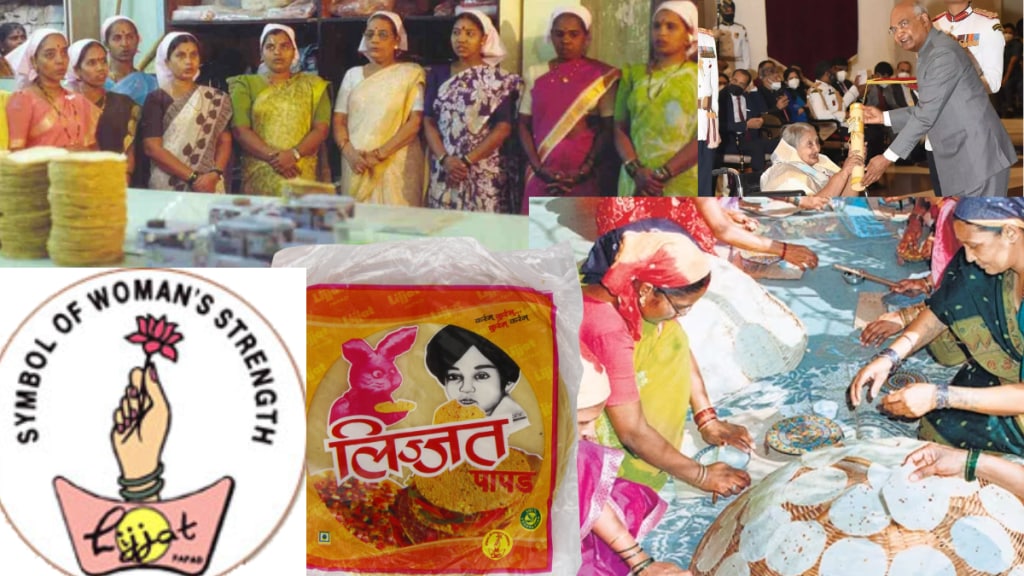Women have for decades been limited to their roles as homemakers, and business has always been looked at as the male bastion. In 1959, seven Gujarati women created history by coming together to create a brand that is now treasured by Indians all over the world. Papad is a crunchy dough that is an essential accompaniment to an Indian meal or a great snack option with fresh toppings. This paper-thin snack was born in India and has travelled the world to our neighbouring countries and beyond. India with its rich history, vibrant culture, and craftsmanship has been the breeding ground for businesses that have had humble beginnings and over the decades have emerged as leading players in their respective worlds. This is the story of seven women and how their business that started with the aim of empowering women is now a leading FMCG company.
The Beginnings
Shri Mahila Griha Udyog Lijjat Papad, or Lijjat as we popularly call it, is based in India and produces a variety of fast-moving consumer items. The roots of the organisation go back to 1959 when seven women in Mumbai started this business with the aim of empowering other women by giving them job opportunities. According to a report by Livemint, with only Rs. 80 as initial capital, the company had an annual revenue of more than Rs. 1600 crore in 2019. These women are Jaswantiben Jamnadas Popat, Parvatiben Ramdas Thodani, Ujamben Narandas Kundalia, and Bhanuben. N. Tanna, Laguben Amritlal Gokani, Jayaben V. Vithalani, and Diwaliben Lukka as per Business Outreach.
Lijjat began as a small-scale business in an urban region, then it extended to the countryside. It is regarded as one of the most outstanding female-led entrepreneurial projects that promotes female empowerment in India. They convened on the terrace of their building on March 15, 1959, and immediately began making four packs of papads. They began selling the papads to a reputable businessman in Bhuleshwar. The women had resolved from the start that they would not ask anyone for money or assistance, even if the group suffered losses. Within three months, 25 women were producing papads. Soon after, the women purchased utensils, cabinets, stoves, and other business-related equipment. The shattered papads were shared among the neighbours.
Becoming multinational
In 1968, Valod in Gujarat became the first branch to be created outside of Maharashtra. Lijjat started making other items like khakhra, masala papad, vadi, wheat atta, and bakery goods after seeing great success with their papads. Lijjat established a printing division in 1977, a division for packing polypropylene in 1978, and flour mills in the 1970s. Agarbattis (incense sticks) and cottage leather were among the group’s other unsuccessful initiatives. Due to the papad’s standardisation, 45,000 women across India produced 4.8 billion papads with comparable flavours, as per Livemint reports.
In 17 Indian states, there are 82 branches of the Lijjat Papad Company. Currently, Lijjat Papad exports its goods with the aid of merchant exporters. They export their goods to over 25 nations, including the United States, United Kingdom, France, Germany, Italy, countries in the Middle East, Thailand, Singapore, Hong Kong, the Netherlands, Japan, Canada, Australia, and South Africa, among many others.
The Lijjat Sisters
The expansion of the Lijjat is frequently observed in the broader context of women’s emancipation. The charity has made a number of attempts to encourage member-sisters and their families to pursue computer and literacy education. On June 18, 1999, literacy courses at Girgaum launched a campaign for sisters.
One of the founders of the women’s worker cooperative Shri Mahila Griha Udyog Lijjat Papad, which produces a variety of fast-moving consumer items, is the Indian entrepreneur Jaswantiben Jamnadas Popat. She received the Padma Shri, India’s fourth-highest civilian honour, in the trade and industry category on January 26, 2021 from the Indian government.
Lijjat has over the years proven its mettle as an organisation that has put women at the centre of business, and empowered them to be independent and to lead. It have proven the test of time and still remains as one of the most popular and selling papad brands in India. It’s a legacy created by legends.








